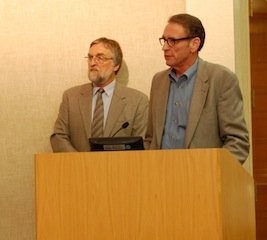For the first time since it was conceived by a city open
government commission
– and following in the footsteps of other California cities –
the Gilroy City Council debated a proposed election ethics
ordinance Monday night which, if approved as it’s currently
drafted, would end all anonymous donations and allow for residents
to bring civil action against candidates who com
mit campaign violations. Full story
Welburn: The road most traveled?
Eyesore of the Week: Loupe Court
Illegal garage sale signs ‘a real issue’
Vaccine or quarantined from class; deadline Thursday
Today’s breaking news:
For the first time since it was conceived by a city open government commission – and following in the footsteps of other California cities – the Gilroy City Council debated a proposed election ethics ordinance Monday night which, if approved as it’s currently drafted, would end all anonymous donations and allow for residents to bring civil action against candidates who commit campaign violations.
The latter proposal was one of several points of contention for Council members, who disagreed that lawsuits were the answer to potential problems during election seasons. The civil action option is intended to penalize candidates who may have violated state or local election laws up to $1,000 or three times the unlawful expenditure – whichever is greater – and fines would be paid to the City of Gilroy, City Attorney Linda Callon said.
Councilwoman Cat Tucker said she had “strong concerns” over the civil action option, and Councilman Perry Woodward, an attorney himself, jokingly called that portion of the ordinance the “Gilroy Lawyer Full Employment Act.”
Councilman and 2012 mayoral candidate Dion Bracco, however, said drafting the penalties was necessary.
“I don’t care for this either, but we need something,” said Bracco, who along with Mayor Al Pinheiro and Councilman Peter Leroe-Munoz comprise the city’s open government commission. “If there are no consequences, then there’s really no rules at all.”
The draft ordinance, as written Monday night, would:
– End anonymous donations – currently, the names attached to donations under $100 do not have to be disclosed;
– Create a forum on the eve of Election Day hosted by the League of Women Voters to allow candidates one final say before residents head to the polls;
– Force candidates to file one pre-election campaign finance statement;
– Raise candidate expenditure ceiling from 50 cents per resident to 70 cents per resident (from approximately $25,000 to $35,000);
– Send informational postcards to residents informing them of the city’s election ethics policies;
– Invite a college intern to help facilitate new election ethics programs;
The ordinance, for now, however, is a work in progress, Council members stressed.
“We’re not inventing the wheel,” Mayor Al Pinheiro said. “We’re following other communities who have proven that it works”
The proposed ordinance is based in part on current election ethics plans in the cities of Santa Clara and Riverside, City Clerk Shawna Freels said.
Woodward made a motion Monday night to send the ordinance back to the open government commission for revisions based on the Council’s suggestions.
The motion passed 6-0.
While Woodward, a 2012 mayoral candidate, agreed with “90 percent” of the draft ordinance, he couldn’t get past the provision that raises the campaign funding ceiling. Gilroy allows for candidates to raise approximately $25,000, but under the proposed ordinance, candidates could haul in up to about $35,000.
“That part of it alone, if kept in here, would be reason enough to vote no,” Woodward said.
But Bracco and Pinheiro said the option to raise more could be necessary for some candidates, as elections are more expensive than in years past.
“It’s not fair to penalize a candidate who wants to raise a lot of money because there’s someone who can’t raise a lot of money,” Bracco said, adding a citywide mailing effort costs about $6,000. “A campaign is getting really expensive. We just thought the time had come to raise it up a bit.”
Woodward said the proposed ordinance should be tabled until the Council’s goal-setting session in January.
Dillon said he was fine with the city’s current campaign set-up.
“I’m not prepared to go forward on this,” he said.
Pinheiro, however, stressed the new ordinance would be necessary to increase community participation in the political process.
“It’s about getting people more engaged. We’re using a little prod if we have to, to get them involved,” Pinheiro said.
COUNCIL MATTERS:
– The Council also reviewed proposed changes to the Santa Clara Valley Habitat Conservation Plan, a 50-year project that proponents say will streamline the permitting process for building on lands where protected and endangered species live. The changes include $280 million in cost reductions and the exclusion of some private development if the land is not home to one of 19 species covered by the plan. The Council will vote whether to move forward and approve pursuing a final plan during its Oct. 3 meeting.
– Councilman Peter Arellano was absent from Monday’s Council meeting because he was ill.
– City Finance Director Christina Turner filled in for Tom Haglund as acting City Administrator. Haglund is attending a conference in Milwaukee, Wisc.
– The Council appointed seven new members to the city’s Youth Commission and one new member to the city’s Bicycle Pedestrian Commission.
THEY SAID IT:
When Councilman Woodward referred to the civil action section of the proposed elections ordinance as the “Gilroy Lawyer Full Employment Act,” Councilman Dillon joked in response, “And you’re all for that, right?”
Opening the public comment period for the elections ethics discussion, Mayor Pinheiro asked if “any of the many hundreds of you in the audience tonight” wanted to speak. The two people in attendance declined.














